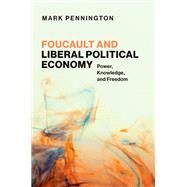Foucault and Liberal Political Economy Power, Knowledge, and Freedom
, by Pennington, Mark- ISBN: 9780197690529 | 0197690521
- Cover: Hardcover
- Copyright: 6/16/2025
This highly original and innovative book is the first to comprehensively engage the ideas of the French social theorist and philosopher Michel Foucault from within the tradition of liberal political economy. Divided into two parts the book commences by demonstrating important commonalities between Foucault's ideas and those of a neglected 'post-modern' stream in liberal political and economic thought. These ideas draw on a social theory emphasising a culturally situated individualism; a philosophy of science highly critical of socio-economic 'scientism' and 'expert rule'; and an understanding of freedom as an open-ended process of 'self-creation' in the face of cultural power relations--a freedom threatened by alignments between state power and more decentred manifestations of power.
Part two combines the tools of Foucault's critical social theory with those of a post-modern liberalism to problematise four separate though overlapping 'bio-political' or 'pastoral' dispositifs in contemporary liberal societies focused on social justice, public health, ecological sustainability, and law and order. Where the Foucauldian and the post-modern liberal approaches suggest that freedom requires a cultural and economic 'creative destruction' that destabilises existing modes of thought and ways of being, the pastoral dispositifs that seek to 'monitor and correct' multiple pattern anomalies are shown to stifle the space for that creative freedom.
Though the book does not engage the question of whether Foucault himself moved towards endorsing liberal political economy, it throws considerable light on how key Foucauldian concerns may be addressed within the liberal tradition, and why Foucauldians may have reason to embrace a reconstituted or post-modern liberalism.
Part two combines the tools of Foucault's critical social theory with those of a post-modern liberalism to problematise four separate though overlapping 'bio-political' or 'pastoral' dispositifs in contemporary liberal societies focused on social justice, public health, ecological sustainability, and law and order. Where the Foucauldian and the post-modern liberal approaches suggest that freedom requires a cultural and economic 'creative destruction' that destabilises existing modes of thought and ways of being, the pastoral dispositifs that seek to 'monitor and correct' multiple pattern anomalies are shown to stifle the space for that creative freedom.
Though the book does not engage the question of whether Foucault himself moved towards endorsing liberal political economy, it throws considerable light on how key Foucauldian concerns may be addressed within the liberal tradition, and why Foucauldians may have reason to embrace a reconstituted or post-modern liberalism.






